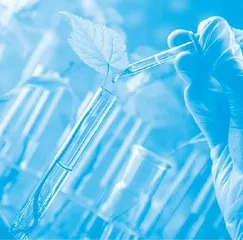7 Things to Know About Biotechnology通过七个方面了解生物技术
作者: 陈晓璐译

The term biotechnology represents a fusion or an alliance between biology and technology. Frankly speaking, biotechnology is as old as human civil-ization, and is an integral part of human life. Thus, biotechnology is a newly discovered discipline for age-old practices.
“生物技术”一词体现了生物学和技术之间的融合或联合。坦率讲,生物技术与人类文明一样古老,它是人类生活不可分割的一部分。因此,生物技术虽然是一门新兴学科,但其实践由来已久。
There are records that wine and beer was prepared in as early as 6000 B.C., bread and curd in 4000 B.C. Today, we know that all these are the processes based on the natural capabilities of microorganisms.
据记载,早在公元前6000年,葡萄酒和啤酒就出现了,而面包和凝乳也在公元前4000年就有了。如今,我们知道这些工艺都是基于微生物的自然能力。
1. Old and new biotechnology
1. 新老生物技术
Many authors prefer to use the term old or traditional biotechnology to refer to the natural processes that have been in use for many centuries to produce beer, wine, curd, cheese and many other foods. The new or modern biotechnology embraces all the genetic manipulations, cell fusion techniques and the improvements made in the old biotechnological processes.
许多人更喜欢用“老的”或“传统”生物技术来称呼几个世纪以来生产啤酒、葡萄酒、凝乳、奶酪和许多其他食物的自然过程。“新的”或“现代”生物技术包括所有的基因编辑、细胞融合技术和对老的生物技术过程所做的改进。
We have to accept that the present day biotechnology is not something new, but it represents a series of technologies, some of them dating back to thousands of years e.g. production of foods, beverages, modification of plants and animals with desired traits. It is only in recent years that these traditional practices are being subjected to scientific scrutiny, understood and improved, at least in some instances.
我们必须承认:如今的生物技术不算什么新鲜事物,但它代表了一系列技术手段,其中一些可以追溯到几千年前:例如食物生产、饮料酿制、改良植物和动物特性。只是在近些年,这些传统做法才经过科学研究并为人所了解,至少在某些情况下得到了改进。
2. Definition(s) of biotechnology
2. 生物技术的定义
The term biotechnology was introduced in 1917 by a Hungarian engineer, Károly Ereky. He used the term for large-scale production of pigs by using sugar beets as the source of food. Ereky defined biotechnology as “all lines of work by which products are produced from raw materials with the aid of living things”.
“生物技术”这个词由匈牙利工程师卡罗伊·埃赖基于1917年提出,最初指以甜菜作饲料大规模养猪。埃赖基将生物技术定义为“利用生物体将原材料加工成产品的各种工艺”。
This definition was almost ignored for many years. For most people, biotechnology represented two aspects of engineering—industrial fermentation and study of the efficiency at work place. The fact that biotechnology is interdisciplinary in nature, with a wide range of applications has created some confusion with regard to its definition. This is mainly because scientists from each discipline have described the term from their own perspective.
多年来,这个定义几乎被人们忽略了。对大多数人来说,生物技术代表了两个方面的工程——工业发酵和对工作场所效率的研究。生物技术跨学科的本质及广泛应用,使其定义不是很清楚。这主要是因为各个学科的专家都从各自角度解释这个术语。
The European Federation of Biotechnology (EFB) broadly considers biotechnology as “the integration of natural sciences and organisms, cells, parts thereof, and molecular analogues for products and services”. In whichever way the term biotechnology has been defined, it essentially represents the use of microbial, animal or plant cells or enzymes to synthesize, breakdown or transform materials.
欧洲生物技术联合会将生物技术泛泛地定义为“将自然科学与生物体(细胞、其组成部分和分子类似物)融合以提供产品和服务”。无论生物技术一词是如何定义的,它本质上都意味着利用微生物、动物、植物细胞或酶来合成、分解或转化材料。
3. History of biotechnology
3. 生物技术史
From the historical perspective, the biotechnology dates back to the time (around 6000 BC) when the yeast was first used to produce beer and wine, and bacteria were first used to prepare yogurt. Some researchers consider Louis Pasteur, who identified the role of microorganisms in fermentation, (between 1857—1876) as the father of biotechnology.
从历史的角度来看,生物技术可以追溯到第一次用酵母生产啤酒和葡萄酒、第一次用菌类制备酸奶的时代(大约公元前6000年)。一些研究人员认为路易·巴斯德是生物技术之父,因为是他(在1857—1876年间)发现了微生物在发酵过程中的作用。
The development of biotechnology, in the first half of twentieth century is associated with the fields of applied microbiology and industrial fermentations (production of penicillin, organic solvents etc.). The development of modern biotechnology is closely linked with the advances made in molecular biology.
20世纪上半叶,生物技术的发展主要与应用微生物学和工业发酵领域(例如青霉素和有机溶剂的生产等)相关。而现代生物技术的发展与分子生物学的进步密切相关。
4. Scientific foundations of biotechnology
4. 生物技术的科学基础
There is almost no discipline among the science subjects that has not contributed either directly or indirectly for the growth of biotechnology. About a dozen specialized branches of science have predominantly provided the inputs for biotechnology.
在科学领域,几乎所有学科都直接或间接地为生物技术的发展做出过贡献。其中大约有十几个专门的科学分支是生物技术发展的主力。
These may be appropriately regarded as the roots of biotechnology, and include biochemistry, genetics, molecular biology, chemical engineering and bioinformatics.
在一定程度上,这些可以视为生物技术的根源,包括生物化学、遗传学、分子生物学、化学工程和生物信息学。
5. Biotechnological tools
5. 生物技术工具
Several methods, techniques or procedures which may be collectively called as biotechnological tools have been developed for transforming the scientific foundations into biotechnological applications. These tools include protein engineering, bioprocess/fermentation technology, cell and tissue culture technology, trans-genesis and antisense technology.